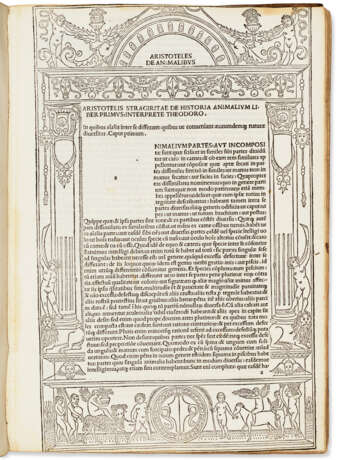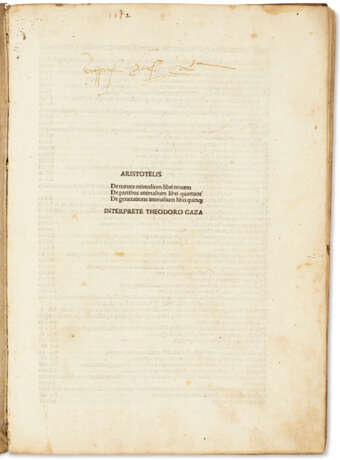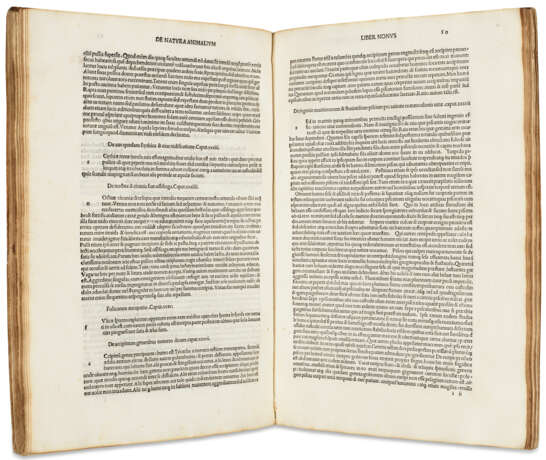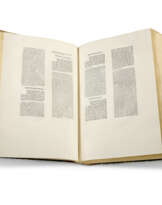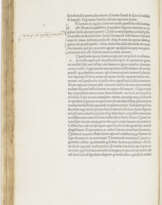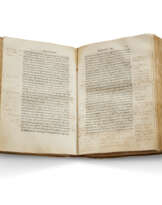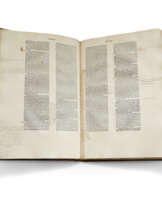ID 1360721
Lot 5 | De animalibus
Estimate value
$ 15 000 – 20 000
Second edition of the first printed text on biology. De animalibus comprises Aristotle’s three main zoological works: De historia animalium, De partibus animalium and De generatione animalium. They formed the first collection of biological treatises ever printed when the first edition appeared at Venice in 1476. None of these texts were included in the Opera until the Aldine Greek edition of 1495–98. They contain ‘an immense collection of biological data – anatomical, physiological, behavioral – on over five hundred species of animals’ (Grolier, Medicine). Theodorus Gaza was a leading Classical scholar, and it was through studying his translation of the present texts, along with the Greek originals printed in the Aldine Opera, that Aldus Manutius recommended learning Greek. The fine full-page border opening the text also appeared in Boccaccio’s Decameron, printed by the same printers in June of the same year. HC(Add) *1700; BMC V 343; BSB-Ink A-679; Bod-inc A-391;Essling 677; GW 2351; Goff A-974; Klebs 85.2; ISTC ia00974000.
Chancery folio (299 × 213mm). 112 leaves. Woodcut border, initial spaces with guide-letters, printer’s device at end (woodcut border just shaved, minor marginal worming, light dampstain at gutter at lower edge not touching text, some light marginal stains). 16th-century binding re-using early 13th-century French vellum leaves from a patristic text over thin pasteboard, manuscript title on spine (stained, worn at spine ends, evidence of fore-edge ties); modern custom quarter morocco clamshell box. Provenance: ‘Vaspach Buch Car.ta’ (inscription dated 1532 on title-page; previously recorded as ‘Gaspar B’) – early intermittent marginalia and underlining – William Foyle (bookplate; his sale, Christie's, 11 July 2000, lot 111).
| Artist: | Aristotle (384 BC - 322 BC) |
|---|---|
| Place of origin: | Italy |
| Auction house category: | Antiquarian books, Medicine & science, Printed books |
| Artist: | Aristotle (384 BC - 322 BC) |
|---|---|
| Place of origin: | Italy |
| Auction house category: | Antiquarian books, Medicine & science, Printed books |
| Address of auction |
CHRISTIE'S 20 Rockefeller Plaza 10020 New York USA | ||||||||||||||
|---|---|---|---|---|---|---|---|---|---|---|---|---|---|---|---|
| Preview |
| ||||||||||||||
| Phone | +1 212 636 2000 | ||||||||||||||
| Fax | +1 212 636 4930 | ||||||||||||||
| Conditions of purchase | Conditions of purchase | ||||||||||||||
| Shipping |
Postal service Courier service pickup by yourself | ||||||||||||||
| Payment methods |
Wire Transfer | ||||||||||||||
| Business hours | Business hours
|
